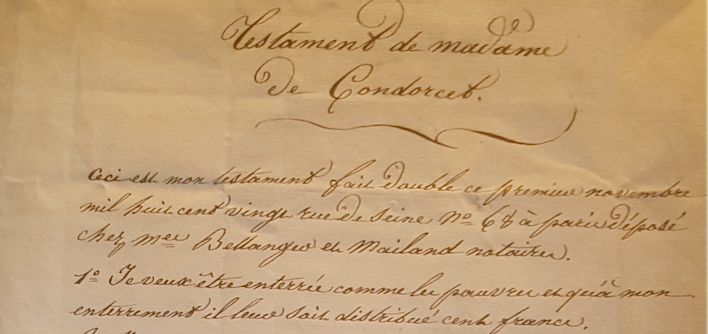|
Paine remarked that the life of the French peasant before the revolution was nothing short of abject, and put paid to the Hobbesian theory that humans were always better off in the civil state than they would be in the state of nature. The revolution was, at least in principle, meant to redress some the most extreme instances of inequality. But the leaders of the revolution are often accused of not really having the best interest of the poor in mind. How would they know what the lives of the poor were like? What did an aristocrat like Sophie de Grouchy really know or care about the poor of France? As a child, with her mother, she visited them - an important part of her education was charitable visits. In her Letters on Sympathy, she thanks her mother for showing her the true value of such hands on charity: Yes, seeing your hands relieve both misery and illness, and the suffering eyes of the unfortunate turning to you, softening as they blessed you, I felt my heart become whole, and the true good of social life was made clear to me, and appeared to me in the happiness of loving and serving humanity There's something perhaps a bit distasteful about the very rich dispensing weekly, or even daily graces on the poor, when they could so easily relive most of their sufferings by relinquishing half their luxuries. Or perhaps this is politically or historically naive. In her Letters on Sympathy, Grouchy theorized her attitude to charity. Hands on charity is good, she says, not just because it relieves suffering, but because it teaches sympathy. Sympathy in turns becomes morality, and justice, and the desire to reform laws and social institutions so that extreme inequalities no longer exist. She does not want to erradicate all inequalities - some that are down to chance, or temperament, will survive. But there is enough good land in France, she says, to ensure that no-one be poor, even if three quarters of it goes to the rich, and the last quarter is divided amongst the common people. Photo of a copy of Sophie de Grouchy's will, held at the Bilbliothèque de l'Institut, courtesy of Millicent Churcher. Sophie saw her ties with the poor through to the end of her life. In her will she asked that instead of being buried at great expense in the family vault, she asked to be buried as a pauper, and that the money saved be distributed to the poor.
0 Comments
Leave a Reply. |
About
This is where I live blog about my new book project, an intellectual biography of three French Revolutionary women philosophers. Categories
All
Archives
November 2022
|

 RSS Feed
RSS Feed